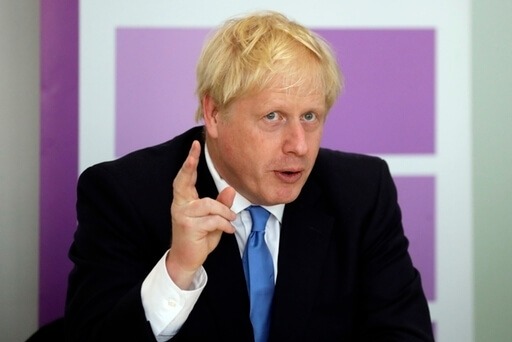
UK PM Boris Johnson Considers Carbon Tax That Would Raise Meat Prices
Families are facing a tax on their lifestyles as Boris Johnson ponders new carbon taxes and charges for Britain that would see higher prices on meat and cheese at the supermarket and on gas for their hobs and boilers at home.
The Prime Minister has ordered Whitehall departments to look at how much greenhouse gas emissions produced by different sectors of the economy cost society.
At present, only airlines and power generators are charged for their emissions, but ministers want to extend the ‘polluter pays’ principle to all sectors. This could lead to a hike in prices for goods such as beef, lamb and cheese, or more heavily polluting forms of heating such as gas.
No costs have been mooted by Whitehall, but recent studies by a team at Oxford University have calculated that surcharges of 40 per cent on beef, 25 per cent on oils, 20 percent on milk, 15 per cent on lamb and 10 per cent on chicken would reduce emissions and reduce consumption in the way the PM wants.
This means that the cost of a sirloin steak, currently around £4.50 in the supermarket, would be around £6.30 and mince would rise to £1.46 to £5.02. Olive oil would increase from £3.75 to £4.69.
Four pints of milk would go from £1.09 to £1.32, four lamb chops up to £7.50 from £6, six chicken breasts up 50p per pack to £5.50 while a whole chicken would increase in price by 28p to £3.78; Eggs would rise to 5p to 94p and sugar would increase by a penny to 66p.
Britain’s meat industry has long believed farmers are ‘unfairly’ criticised by environmentalists and consumers will also pay the price.
Neil Shand, from the National Beef Association, said: ‘Britain’s meat industry is given a lot of unfair criticism over its environmental impact.’ National Pig Association chairman Richard Lister added: ‘There has been a heavy bias against meat when it comes to climate change discussions.’
A study by the Oxford Martin Programme on the Future of Food calculated tax levels for everyday items that would reduce carbon and consumption. Academics believe 40 per cent on beef would be required, 25 per cent on oats and 20 per cent on lamb.
Responding to reports of new carbon taxes on meat, cheese and gas heating, John O’Connell, chief executive of the TaxPayers’ Alliance, said:
‘New eco taxes would leave slim pickings for struggling families, who rely on cheap energy and food to heat their homes and put dinner on the table.
‘With the highest tax levels in 70 years, taxpayers have already had their belts tightened.
‘Ministers must ease the burden on Brits before any green tax hikes.’ The Oxford research also said taxes on rice, wheat, pork, maize, eggs, vegetables and sugar should be between three and 10 per cent would cover damage their production causes to the environment.
In Canada they have recently introduced a carbon tax rising at $10 per ton of CO2 per year, reaching $50 per ton in 2022. Consumers say that it now accounts for around 16 per cent of a monthly bill. This would add around £6 to the UK average monthly gas bill of £50.
Mr Johnson, who will host the United Nations’ climate change conference in Glasgow in November, is reportedly looking at the proposals as he attempts to deliver on the Government’s net zero carbon pledge by 2050.
A Whitehall memo leaked to The Times apparently shows Downing Street and the Treasury have asked all departments for plans for a carbon-pricing scheme across all areas of the economy.
‘The Chancellor and the Prime Minister want a sector-by-sector view on how we could implement some form of carbon pricing and an overall roadmap to deliver [it] in the next decade,’ it stated. The document suggested these could include a direct ‘carbon tax’.
The Government-owned Behavioural Insights Team, also known as the ‘nudge unit’, has previously suggested a carbon tax on high-impact food.
Last year Boris Johnson announced a more ambitious plan to cut greenhouse gas emissions, despite warnings that it will be a ‘colossal challenge’.
The Prime Minister wants the UK to lead the charge ahead of hosting next year’s climate talks.
He hopes Britain will cut emissions faster than any other major economy and has beefed up a previous target. Instead of reducing emissions by 61 per cent on 1990 levels by 2030, Mr Johnson wants them cut by at least 68 per cent.
He aims to put environmental issues at the heart of Britain’s economy after the Brexit ‘transition’ phase ends this month. It will also allow the PM to find common ground with US president Joe Biden, who has promised to take a leading role on climate issues.

